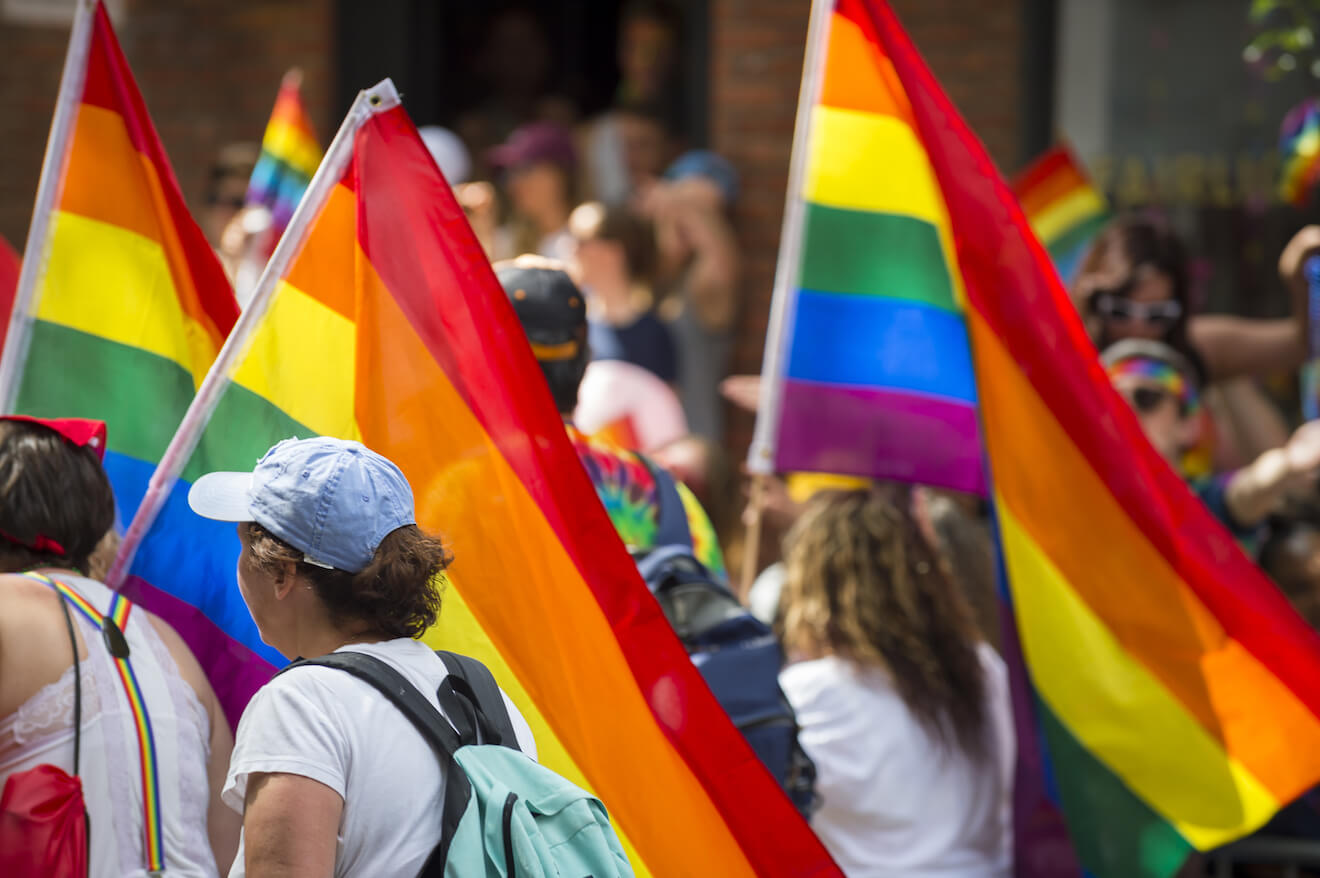As rainbow streamers fill the air and LGBTQ representation fills the streets, June is a time to celebrate LGBTQ identity and the contributions of the queer movement. Pride is a joyful time for the LGBTQ community and allies alike. It’s also a time to reaffirm our commitment to creating a more equal world. That’s why this Pride, we invite allies and supporters of the LGBTQ community — which should be everyone! — to show up for the mental health and wellbeing of their LGBTQ loved ones and the community at large.
While in the past, psychologists considered gay, lesbian, bisexual, queer, and trans identity to be a mental illness, today’s professional standards recognize queer identity as normal and healthy. However, the LGBTQ community continues to face devastatingly high rates of mental illness, including elevated rates of depression, substance abuse, and suicide. Harassment is also common, with 65% of LGBTQ people reportedly experiencing some form of anti-LGBTQ harassment or discrimination in 2016.
Transgender people face a particularly heavy burden, with increased rates of harassment resulting in a staggering 40 percent of transgender people who have reported attempting suicide. These mental health struggles are due in large part to the effects of discrimination.
These facts are alarming, but they’re not an necessarily indication of what the future holds. As LGBTQ people have become more visible, resources have emerged to encourage and support their mental health. Change doesn’t come by itself, however, and the gains of the LGBTQ community are thanks to the tireless work of LGBTQ activists, and the support of allies. If you’re an ally, you can be part of this movement. Here are some ways allies can support the mental health of LGBTQ people in their lives, both for Pride Month and beyond.
1. Question your Biases
While you love your LGBTQ friends and family, and support LGBTQ rights, we all have implicit biases that can cause us to act in a discriminatory manner without being aware of it. To support the LGBTQ people in your life, first work on yourself.
Learn about LGBTQ identities, the LGBTQ movement, and the issues facing the LGBTQ community. Question your own assumptions about love, sex, and what it means to be part of a relationship or a family. It’s okay to have questions or make mistakes as part of the learning process. By educating yourself first, you can acknowledge these mistakes and grow from them to better support your loved ones.
2. Respect Their Identity
Research has found that affirming LGBTQ people’s identities can actually save their lives. For example, transgender youth whose community uses their personally chosen names have a reduced suicide risk.
Respect the identity of LGBTQ people in your life by affirming how they choose to live, love, and identify. Use their chosen gender pronouns, respect how they choose to dress and present themselves physically, accept the gender of their partners, and don’t pressure them to conform to your or society’s idea of self-expression, family, or love.
3. Don’t “Out” Them Without Their Permission
Navigating when to be “out” about one’s sexual orientation or gender identity is a highly personal choice. There are lots of reasons an LGBTQ person might choose to be out in some contexts and not as open in others.
While there’s nothing shameful or secret about being LGBTQ, everyone has the right to make choices to facilitate their own comfort and safety. Follow the lead of your LGBTQ loved one in terms of how open they wish to be about their identity, and make sure they know you support them however they choose to express themselves.
4. Have Their Back
LGBTQ people face a set of obstacles or barriers in daily life that non-LGBTQ people simply don’t have to deal with. Your job as an ally is to lessen those barriers by making the spaces you’re in more LGBTQ-friendly.
If your relative is queer, you can educate other family members on LGBTQ identity, and support them if they’re faced with discrimination from family members. In the workplace or educational space, you can advocate for diversity trainings and gender neutral bathrooms. And anywhere you go, you can call out anti-LGBTQ words and actions when you see them.
5. Support Them in Accessing Mental Health Resources
Everyone needs support, whether it’s a friend whose shoulder we can lean on or a therapist to help us work through trauma from our past. Supporting the mental health of your LGBTQ loved ones requires all the conventional skills of being a good friend: be present, make sure they know you are there for them, and don’t hesitate to reach out if you notice they’re going through a hard time.
There are also extra ways you can support your LGBTQ loved ones. You can help them find LGBTQ-friendly therapists, whether brick and mortar, or online therapists, connect them with LGBTQ support groups or mentors, and let them know they can always call you or any of the LGBTQ-friendly mental health hotlines (listed below) if they need help.
6. Donate, Donate, Donate!
We can make a big difference in our personal relationships, but movements don’t run on friendship alone — they also need monetary support. This Pride Month, support LGBTQ mental health by donating to LGBTQ-friendly mental health and anti-discrimination organizations like the Trevor Project, the Anti-Violence Project, and Trans Lifeline.
As the bright colors of Pride fill the streets with joy, LGBTQ people and their allies take heart in a sense of community and belonging. When the confetti has cleared and the parade has ended, allies have a big role to play in making sure LGBTQ visibility isn’t just for one day. The more actively you advocate for the mental health and wellbeing of the LGBTQ community by raising awareness and supporting your loved ones, the closer we all come to making sure LGBTQ mental health is a reality every day of the year.
Are you an LGBTQIA+ or questioning person in distress? Reach out. The below numbers are confidential, LGBTQIA-friendly hotlines dedicated to helping people just like you.
The Trevor Project : 866-488-7386
Trans Lifeline: 877-565-8860
LGBTQ National Help Center: 1-888-843-4564
LGBT National Youth Talkline: 800-246-7743 (youth serving youth, through age 25)
LGBT National Senior Hotline: 888-234-7243
LGBT National Coming Out Support Hotline: 888-688-5428
Talkspace articles are written by experienced mental health-wellness contributors; they are grounded in scientific research and evidence-based practices. Articles are extensively reviewed by our team of clinical experts (therapists and psychiatrists of various specialties) to ensure content is accurate and on par with current industry standards.
Our goal at Talkspace is to provide the most up-to-date, valuable, and objective information on mental health-related topics in order to help readers make informed decisions.
Articles contain trusted third-party sources that are either directly linked to in the text or listed at the bottom to take readers directly to the source.




